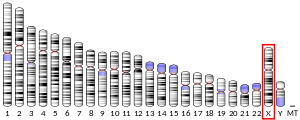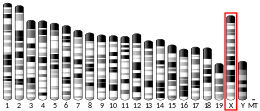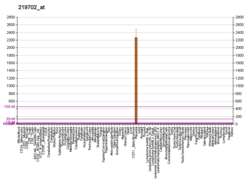Placenta-specific protein 1 is a protein that in humans is encoded by the PLAC1 gene.[5][6]
References
- 1 2 3 GRCh38: Ensembl release 89: ENSG00000170965 - Ensembl, May 2017
- 1 2 3 GRCm38: Ensembl release 89: ENSMUSG00000061082 - Ensembl, May 2017
- ↑ "Human PubMed Reference:".
- ↑ "Mouse PubMed Reference:".
- ↑ Cocchia M, Huber R, Pantano S, Chen EY, Ma P, Forabosco A, Ko MS, Schlessinger D (Nov 2000). "PLAC1, an Xq26 gene with placenta-specific expression". Genomics. 68 (3): 305–12. doi:10.1006/geno.2000.6302. PMID 10995572.
- ↑ "Entrez Gene: PLAC1 placenta-specific 1".
Further reading
- Fant M, Weisoly DL, Cocchia M, et al. (2003). "PLAC1, a trophoblast-specific gene, is expressed throughout pregnancy in the human placenta and modulated by keratinocyte growth factor". Mol. Reprod. Dev. 63 (4): 430–6. doi:10.1002/mrd.10200. PMID 12412044.
- Strausberg RL, Feingold EA, Grouse LH, et al. (2003). "Generation and initial analysis of more than 15,000 full-length human and mouse cDNA sequences". Proc. Natl. Acad. Sci. U.S.A. 99 (26): 16899–903. doi:10.1073/pnas.242603899. PMC 139241. PMID 12477932.
- Ota T, Suzuki Y, Nishikawa T, et al. (2004). "Complete sequencing and characterization of 21,243 full-length human cDNAs". Nat. Genet. 36 (1): 40–5. doi:10.1038/ng1285. PMID 14702039.
- Gerhard DS, Wagner L, Feingold EA, et al. (2004). "The Status, Quality, and Expansion of the NIH Full-Length cDNA Project: The Mammalian Gene Collection (MGC)". Genome Res. 14 (10B): 2121–7. doi:10.1101/gr.2596504. PMC 528928. PMID 15489334.
- Concu M, Banzola I, Farina A, et al. (2005). "Rapid clearance of mRNA for PLAC1 gene in maternal blood after delivery". Fetal Diagn. Ther. 20 (1): 27–30. doi:10.1159/000081365. PMID 15608456.
- Massabbal E, Parveen S, Weisoly DL, et al. (2005). "PLAC1 expression increases during trophoblast differentiation: evidence for regulatory interactions with the fibroblast growth factor-7 (FGF-7) axis". Mol. Reprod. Dev. 71 (3): 299–304. doi:10.1002/mrd.20272. PMID 15803460.
- Otsuki T, Ota T, Nishikawa T, et al. (2007). "Signal sequence and keyword trap in silico for selection of full-length human cDNAs encoding secretion or membrane proteins from oligo-capped cDNA libraries". DNA Res. 12 (2): 117–26. doi:10.1093/dnares/12.2.117. PMID 16303743.
- Fujito N, Samura O, Miharu N, et al. (2007). "Increased plasma mRNAs of placenta-specific 1 (PLAC1) and glial cells-missing 1 (GCM1) in mothers with pre-eclampsia". Hiroshima J. Med. Sci. 55 (1): 9–15. PMID 16594548.
- Rizzo N, Banzola I, Concu M, et al. (2007). "PLAC1 mRNA levels in maternal blood at induction of labor correlate negatively with induction-delivery interval". Eur. J. Obstet. Gynecol. Reprod. Biol. 132 (2): 177–81. doi:10.1016/j.ejogrb.2006.05.039. PMID 16860456.
- Fant M, Barerra-Saldana H, Dubinsky W, et al. (2007). "The PLAC1 protein localizes to membranous compartments in the apical region of the syncytiotrophoblast". Mol. Reprod. Dev. 74 (7): 922–9. doi:10.1002/mrd.20673. PMID 17186554.
- Purwosunu Y, Sekizawa A, Farina A, et al. (2007). "Cell-free mRNA concentrations of CRH, PLAC1, and selectin-P are increased in the plasma of pregnant women with preeclampsia". Prenat. Diagn. 27 (8): 772–7. doi:10.1002/pd.1780. PMID 17554801.
- Koslowski M, Sahin U, Mitnacht-Kraus R, et al. (2007). "A placenta-specific gene ectopically activated in many human cancers is essentially involved in malignant cell processes". Cancer Res. 67 (19): 9528–34. doi:10.1158/0008-5472.CAN-07-1350. PMID 17909063.




